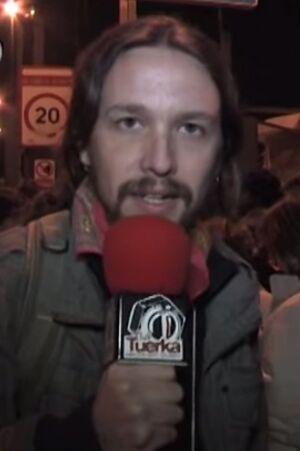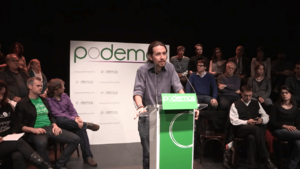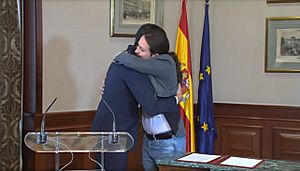Pablo Iglesias Turrión facts for kids
Quick facts for kids
Pablo Iglesias
|
|
|---|---|
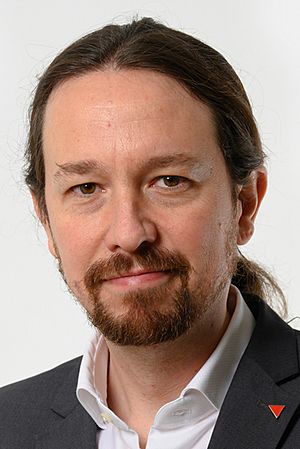
Iglesias in 2020
|
|
| Second Deputy Prime Minister of Spain | |
| In office 13 January 2020 – 31 March 2021 |
|
| Monarch | Felipe VI |
| Prime Minister | Pedro Sánchez |
| Preceded by | Manuel Chaves (2011) |
| Succeeded by | Nadia Calviño |
| Minister of Social Rights and 2030 Agenda | |
| In office 13 January 2020 – 31 March 2021 |
|
| Prime Minister | Pedro Sánchez |
| Preceded by | María Luisa Carcedo (Health, Consumer Affairs and Social Welfare) |
| Succeeded by | Ione Belarra |
| Secretary General of Podemos | |
| In office 15 November 2014 – 4 May 2021 |
|
| Preceded by | Position established |
| Succeeded by | Ione Belarra |
| Member of the Congress of Deputies | |
| In office 13 January 2016 – 26 March 2021 |
|
| Constituency | Madrid |
| Member of the European Parliament | |
| In office 1 July 2014 – 27 October 2015 |
|
| Constituency | Spain |
| Personal details | |
| Born | 17 October 1978 Madrid, Spain |
| Political party | Podemos (since 2014) |
| Other political affiliations |
Communist Youth Union of Spain (1992–1999) |
| Domestic partners | Tania Sánchez (2008–2015) Irene Montero (since 2017) |
| Children | 3 |
| Alma mater | Complutense University Charles III University European Graduate School |
| Signature | |
Pablo Iglesias Turrión (born 17 October 1978) is a Spanish political scientist and former politician. He served as the Second Deputy Prime Minister of Spain and as the Minister of Social Rights and 2030 Agenda for the Spanish government from 2020 to 2021.
He was also a member of the Congress of Deputies (Spain's parliament) from 2016 to 2021, representing Madrid. Pablo Iglesias is one of the people who started Podemos, a political party he led from 2014 until he left politics in 2021. Before his time in government, he taught political science at the Complutense University of Madrid and hosted TV shows. He was first elected to the European Parliament in 2014.
Contents
About Pablo Iglesias
His Family and Early Life
Pablo Manuel Iglesias Turrión was born on 17 October 1978 in Madrid, Spain. His mother, Luisa Turrión, was a lawyer for a trade union. His father, Javier Iglesias, was a labor inspector and history teacher. Pablo was named after Pablo Iglesias Posse, a famous leader who started the Spanish Socialist Worker's Party (PSOE) in 1879.
When he was two, his family moved to Soria. He lived there until he was 13. After his parents separated, he moved back to Madrid with his mother. They settled in Vallecas. At 14, he joined the Communist Youth. He also took part in protests against globalization, encouraging peaceful ways to make changes.
From 1996 to 2001, Iglesias studied law at the Complutense University of Madrid. He then studied Political Science, where he earned top grades. He also studied in Italy as part of the Erasmus programme. Besides Spanish, he can speak English and Italian.
His Work and Studies
In 2003, Pablo Iglesias started a TV show called La Tuerka on a local TV station. This show later moved to a bigger online platform. He also earned teaching certificates and advanced degrees, including a PhD in 2008. His PhD research was about collective action and protests in Spain and Italy. He also earned master's degrees in humanities and communication.
In the early 2000s, Iglesias worked with the Center for Political and Social Studies Foundation (CEPS). He spent time on their executive board. He also worked in Latin American politics for CEPS. He observed elections in Paraguay and Bolivia. He also advised the governments of Venezuela and Bolivia.
He worked as a senior lecturer of political science at the UCM. He became an honorary professor there in 2014. Since 2002, he has written many articles for academic journals. He also wrote for news websites like Público.
In 2012, he worked as a political advisor for United Left's Yolanda Díaz. This was for an election campaign in Galicia. In 2013, he started hosting another TV show called Fort Apache. This show discussed political topics weekly.
In April 2013, Iglesias was invited to a political talk show called El gato al agua. This was a big moment for him. It opened doors to more mainstream media. He became a regular guest on many TV political shows. In October 2013, he received an award for his work in social change.
Starting Podemos
In late 2013, Iglesias and some friends discussed starting a new political group. They wanted to run in the 2014 European Parliament election. Iglesias had the name Podemos in mind. It means "We Can" in Spanish.
In January 2014, Iglesias officially launched the Podemos movement. He wanted it to be a political party. He was chosen to lead the party's list in open elections. His face was used on the ballot because he was more well-known than the new party.
Podemos won 5 seats in the European Parliament election. Iglesias became a MEP. He worked on committees dealing with foreign affairs and human rights. He also hosted a new TV show called Otra vuelta de tuerka. On this show, he interviewed many public figures.
In November 2014, Iglesias became the first Secretary-General of Podemos. He received strong support from party members.
Political Challenges
In October 2015, Iglesias left his seat in the European Parliament. He wanted to focus on the campaign for the 2015 Spanish general election. Podemos won 44 seats in the Spanish parliament. They formed a large group with other parties, becoming the third biggest group.
Podemos tried to form a government with the PSOE party. However, they could not agree on all points. After no government was formed, a new election was called for June 2016.
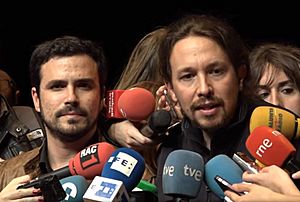
In May 2016, Pablo Iglesias and Alberto Garzón (leader of IU) announced an agreement. They formed an alliance between Podemos and IU for the election. This alliance was called Unidos Podemos. Iglesias led the list in Madrid. The alliance won 71 seats, remaining the third largest group.
In 2017, Iglesias and Podemos proposed a vote to remove the government. This was due to corruption scandals. Other parties did not support it, and the motion failed.
In May 2018, Iglesias and his partner Irene Montero faced a vote of confidence within Podemos. This was because they bought a house that some members felt was too expensive. They won the vote with 68.4% support.
After the April 2019 general election, Iglesias negotiated with the PSOE party. He wanted Podemos politicians to be part of the government. However, these talks failed, and a government was not formed at that time.
Joining the Government
After the November 2019 general election, Pedro Sánchez and Iglesias announced an agreement. The PSOE and Unidas Podemos would form a government together. Sánchez became prime minister in January 2020.
Pablo Iglesias was appointed as the Second Deputy Prime Minister. He also became the Minister of Social Rights and 2030 Agenda. He took office on 13 January 2020. When he became Deputy Prime Minister, Iglesias stopped hosting his TV shows.
Leaving Politics
On 15 March 2021, Iglesias announced he would leave the government. He planned to lead his party in the 2021 Madrilenian regional election. His seat in the national parliament was taken by Mercedes Pérez Merino.
In April 2021, Iglesias received a letter with a death threat and bullets. Other politicians received similar threats. During a debate, a candidate from another party questioned if these threats were real. Iglesias walked out of the debate, followed by other party leaders.
Podemos did not perform well in the election. They placed fifth. After the results were announced, Iglesias said he would resign from his positions and leave politics. He mentioned that he and his family had faced daily harassment at their home.
Life After Politics
After leaving politics, Pablo Iglesias returned to working in the media. He became a presenter and commentator. In November 2022, he announced a plan to raise money for a new leftist television channel called Canal Red. The channel started broadcasting online on 6 March 2023.
His Ideas and Beliefs
Pablo Iglesias admires the Italian Communist Party and Antonio Gramsci. He is interested in the strategies of political leaders like Palmiro Togliatti. He also likes the ideas of Antonio Negri.
At a Podemos party meeting in 2017, Iglesias supported strengthening the alliance between Podemos and United Left. He believed this would make the party stronger. In August 2015, Iglesias supported Jeremy Corbyn's campaign to lead the Labour Party in the UK.
He has often spoken positively about the Venezuelan government's policies. He admired the ideas of Hugo Chávez. However, he later changed some of his public statements about Venezuela. He called the situation there a "disaster." Iglesias is also a strong supporter of a republic in Spain. He believes a "new republic would be the best guarantee of a united Spain." He is not religious but agrees with many of Pope Francis's views.
Electoral History
| Election | List | Constituency | List position | Result |
|---|---|---|---|---|
| European parliament election, 2014 | Podemos | Spain | 1st (out of 54) | Elected |
| Spanish general election, 2015 | Podemos | Madrid | 1st (out of 36) | Elected |
| Spanish general election, 2016 | Unidos Podemos | Madrid | 1st (out of 36) | Elected |
| Spanish general election, April 2019 | Unidas Podemos | Madrid | 1st (out of 37) | Elected |
| Spanish general election, November 2019 | Unidas Podemos | Madrid | 1st (out of 37) | Elected |
| Madrilenian regional election, May 2021 | Podemos-IU | Madrid | 1st (out of 136) | Elected |
Works
- Author
- Diario Red
- Coauthor
- Editor
Podcast
- "La Base" video podcast via Publico: https://www.publico.es/publico-tv/la-base
- "La Base" video podcast via Canal Red: https://www.youtube.com/@canalredtv/playlists
See also
 In Spanish: Pablo Iglesias Turrión para niños
In Spanish: Pablo Iglesias Turrión para niños


